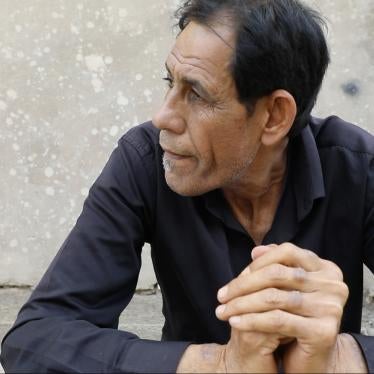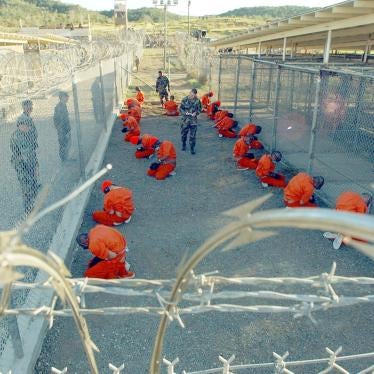The Supreme Court’s decision today rejecting the unfair military commissions at Guantánamo Bay upholds the U.S. tradition of fair trials and advances the important fight against terrorism. Human Rights Watch welcomes the Supreme Court’s repudiation of a system that failed to meet basic standards for a fair trial.
“We welcome the Supreme Court’s repudiation of a system that failed to meet basic standards for a fair trial,” said Kenneth Roth, executive director of Human Rights Watch. “The Bush administration should now focus on properly prosecuting terror suspects and providing justice for their victims. That means the U.S. must end the abusive interrogation techniques that hamper its ability to put these men on trial.”
In Hamdan v. Rumsfeld, the Supreme Court decided 5-3, with Chief Justice John Roberts not participating, that President George W. Bush did not have authority to set up the tribunals at Guantánamo Bay, Cuba, and found the commissions illegal under both military justice law and the Geneva Conventions.
The Supreme Court found that common article 3 to the 1949 Geneva Conventions applies to the armed conflict with al-Qaeda. Common article 3 provides that all detainees, whether prisoners of war, civilians or so-called unlawful combatants, are legally entitled to humane treatment “in all circumstances.” They may not be subject to “cruel treatment and torture” or “outrages upon personal dignity, in particular, humiliating and degrading treatment.”
This holding would not only apply to the handful of Guantánamo detainees charged with crimes, but to all the detainees held by the United States in the “global war on terror,” including those at Guantánamo and at Bagram in Afghanistan, as well as the “ghost detainees” held at secret prisons. It strongly calls into question the legality of holding detainees incommunicado and the CIA’s use of coercive interrogation techniques.
Human Rights Watch has long criticized the military commissions at Guantánamo, set up by the Bush administration to try foreign terrorism suspects, as failing to meet the most basic requirements for a fair trial. The commissions effectively allowed the use of evidence acquired through abusive interrogations, placed undue restrictions on military and civilian defense counsel to present an effective defense, and denied meaningful review by civilian courts.
The Supreme Court decision will likely compel the Bush administration to transfer Guantánamo cases to federal courts or courts-martial, or to drop pending criminal charges. Prosecuting terrorist suspects before such regular courts will better ensure that fair trial rights are respected. Showing that justice will be done is an essential component of any effective counterterrorism strategy that seeks to enlist allies concerned about torture, arbitrary detention or fair trials, Human Rights Watch said.
“The military commissions have been a disaster for the United States,” said Roth. “Shifting the Guantánamo trials to regular courts will provide for fair trials and advance the fight against terrorism.”
Today’s Supreme Court decision has no direct impact on the continued use of Guantánamo Bay to detain persons, but it may require that their treatment conform to the requirements of the Geneva Conventions. It also is likely to increase pressure for its closure. In response to increasing international and domestic pressure to close Guantánamo, Bush has repeatedly said over the past few weeks that any decision to close the facility would have to wait until the Supreme Court ruled on the military commissions.
Human Rights Watch has called for the United States to close Guantánamo and secret prisons that detain persons arbitrarily and indefinitely in violation of international human rights and humanitarian law. Those unlawfully detained should be prosecuted in accordance with international fair trial standards or released. No detainee can be transferred to a country where he is at risk of torture or other mistreatment.








